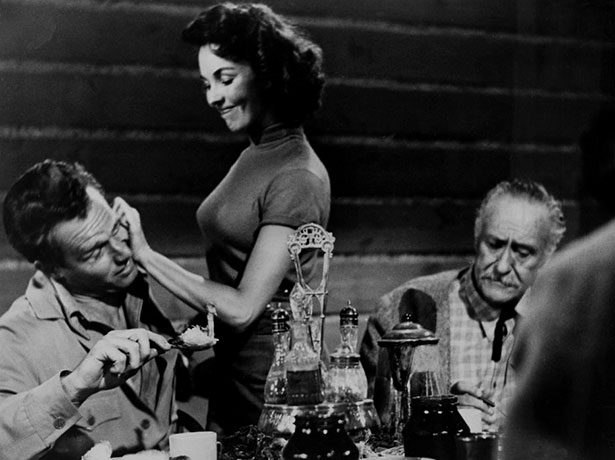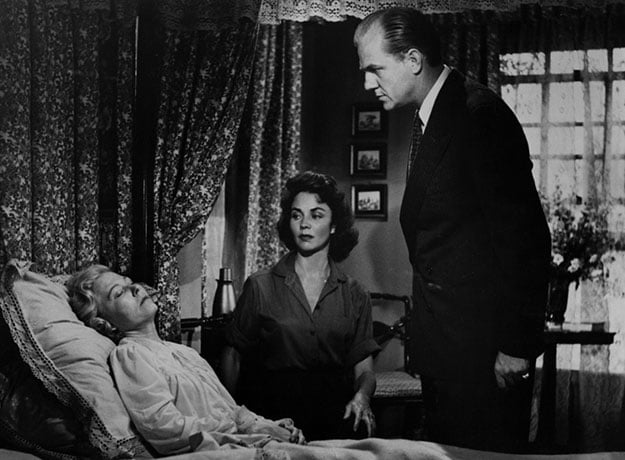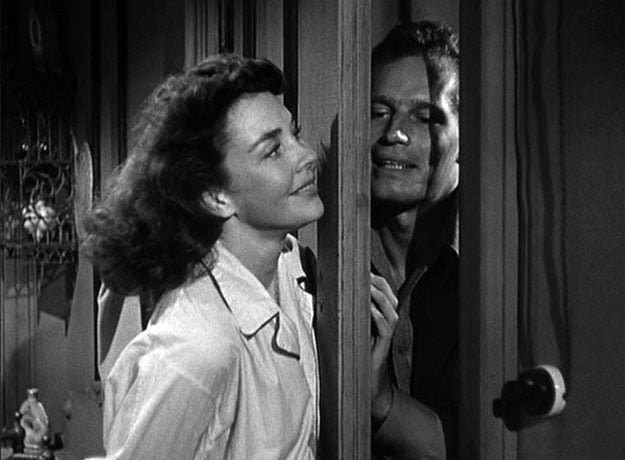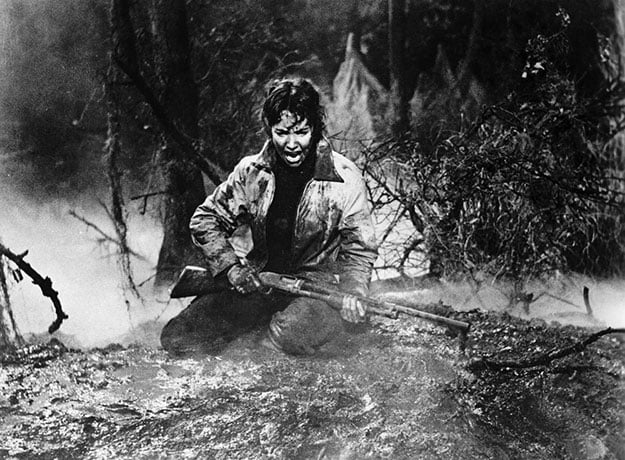TCM Diary: Ruby Gentry

Bobbie Gentry, the creator of that sleepy-dusty 1967 hit “Ode to Billie Joe,” took her stage name from King Vidor’s 1952 film Ruby Gentry. Of course she did: Bobbie Gentry, born Roberta Lee Streeter, was raised on her grandparents’ farm in Chicasaw County, Mississippi, and climbed her way to pop-music stardom after an adolescent move to Los Angeles; the heroine of the film is “born on the wrong side of the tracks” in a coastal North Carolina town, rising above her station to become Gentry-fied yet remaining untamed. Another link: “Ode to Billie Joe” is a great gothic-folk ballad, and Ruby Gentry is a swampwater tragedy that contains memorable music in the form of folk singing (via Ruby’s unpleasant evangelical brother) and its classic score, composed by Heinz Roemheld, which would later become a standard when sung by Ray Charles with Mitchell Parish’s lyrics.
Vidor, always a director who excelled when close to the earth, gets at something authentically wild and vital in this blend of seaside noir and Southern-fried soap opera. Ruby Gentry is a studio production directed by a mainstream, officially conservative filmmaker, yet its leanings are disruptive; its dialogue is sometimes sharp, but sometimes purply; its actors are blunt objects yet indelible.
There’s Ruby (Jennifer Jones), who grew up poor yet received a social education by virtue of spending her teen years raised by two of the town’s upstanding citizens, Jim and Letitia Gentry (Karl Malden and Josephine Hutchinson). Ruby wears blue jeans, is a crack shot, and can gut a deer faster than a man can. She is in mutual lust with Boake Tackman—was there ever a greater age for naming characters than the mid-20th century?—a rough-and-tumble entrepreneur played by early-vintage Charlton Heston. Boake will reject Ruby because the town needs him to wed the respectable Tracy (Phyllis Avery), a marriage that will unite two local dynasties into a capitalist juggernaut, especially after Boake drains the swamp and turns marshy land into rich, exploitable territory. Tracy is “as bright as a dollar” (Sylvia Richards’s screenplay has some nasty touches), while Ruby is dark, sweaty, and unbridled in her enthusiasm for post-coital moonlight drives along the beach.

Some of the dialogue blames Ruby for her downfall, but Vidor’s directorial attitude is ambiguous. Her vitality is at the center of almost every scene, and we sympathetically see how the deck is stacked against her. In the film’s first proper sequence, Ruby serves coffee to a table of men, who gorge on their chicken dinner as they comment on her sex appeal. These are the same creeps who will later blame her for a death in the community, and whom she will coolly demolish with her newfound wealth. Boake grabs her by the ass, and Ruby rakes her fingernails across his face.
Boake might appear to be in a line of previous Vidor heroes, empire-builders such as Brian Donlevy in An American Romance or Gary Cooper in The Fountainhead, or the small-scale collectivists in Our Daily Bread. But this is not Boake’s story. He sells out his own desires in exchange for success and money, and he treats Ruby like trash, something she does not accept. (There’s a little Annie Oakley syndrome here—the American male’s fear that a woman can out-shoot him.) In another movie, his dream of clearing the land and building things would be presented as an admirable and manly endeavor, but I doubt that anybody who’s ever watched Ruby Gentry has failed to cheer on Ruby as she pulls the plug on the pumps that will flood Boake’s big drainage scheme (he’s already compared the pump to his own heartbeat, which adds a nice dash of Tabasco to her revenge).
That makes Ruby inadvertently modern: she’s actually restoring the wetlands, an act that might save future North Carolinians from the brunt of a hurricane. For this, she’s permanently ostracized by the town, and she’s glimpsed in the opening and closing scenes as a lonely, aging figure on a boat—“a sort of Flying Dutchwoman, scapegoat for the town’s sins,” per Raymond Durgnat and Scott Simmon. (We might just mention here that for many years, having failed to match the popularity of “Ode to Billie Joe,” Bobbie Gentry has resided in financially secure seclusion, rumored to be on an estate in the vicinity of the Tallahachie River she mythologized.)

I hope King Vidor isn’t entirely in the museum-piece section of film history, because he remains an eloquent artist of the studio era. This rock-ribbed Republican had already thrown himself over to the bestial energies of Duel in the Sun and The Fountainhead when Ruby Gentry came along. There are almost no shots in Ruby Gentry (photographed by Russell Harlan) that are dull or conventional, even though the movie doesn’t scream out with style (as, say, Samuel Fuller’s The Naked Kiss does, a deservedly celebrated movie that overlaps with Ruby Gentry in its sympathy to “wayward” women). Case in point: a striking, very modern composition that poses a conflicted Ruby at a window, a shot not quite like anything else I’ve seen. Ruby is in profile, medium distance, writhing as though tossed by some internal tempest as she listens to her theme music on the record player—a shadowy, sensuous visual outburst that seems to be the film letting off steam.
Jennifer Jones is a big part of the film’s subversion of its own story. I have always found Jones a bizarre screen presence, exaggerated in her features and unpredictable in her delivery. Here, she frequently displays Ruby’s physicality with the sort of over-indicating that might come from a director suggesting she display Ruby’s physicality. And yet, she is compelling—the mix of defiant earthiness and insecurity, the sudden drops into the lower register of her husky voice. When she runs the stock of a rifle across one of her massive cheekbones early in the film, we are in a place beyond interpretation and into cinematic mystery.
I’m not going to declare that Ruby Gentry is a litmus test for cinephilia, especially because the film itself fails all litmus tests. But there is something about it that gets to the heart of how movies live and why we watch them. That “something” is wrapped inside a contradictory film that ultimately gives way to the delirious powers of animal magnetism, deft shadowplay, and compositional expressiveness. If you love movies, you know the camera lets hobgoblins loose. Good taste and ideological purity are little match for a mud-spattered Jennifer Jones and Charlton Heston creating a Pietà in a swamp.

That finale is a descent into the quagmire, which manages to sink Ruby and Boake into an obviously studio-built bog. And yet the artifice is fine, because we’re in the realm of folklore now, our protagonists transmogrified into figures in a murder ballad, reduced to the steaming earth, all the pretenses of civilization finally thrown away. These two people look absolutely at home out there in the primeval gunk, and so does Ruby Gentry.
Robert Horton is film critic of the Seattle Weekly.







